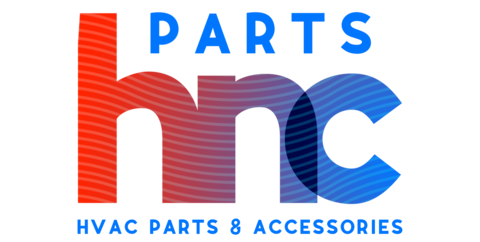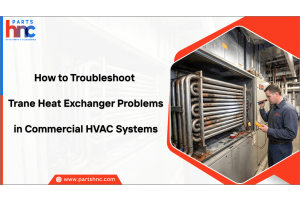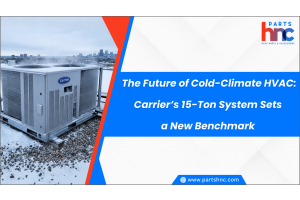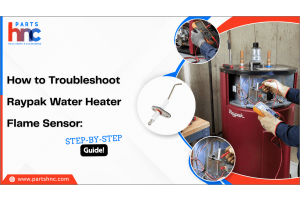Next-Level HVAC: Bosch RTU Shines in DOE Technology Challenge
Bosch Home Comfort Group has secured a pivotal win for sustainable commercial climate control after its advanced rooftop unit (RTU) successfully passed and exceeded the rigorous laboratory testing phase of the U.S. Department of Energy (DOE) Commercial Building HVAC Technology Challenge. This accomplishment, featuring the innovative YORK brand heat pump part of the Bosch portfolio cements the company’s position at the forefront of the industry’s shift toward highly efficient, all-electric heating and cooling.
The 15-ton heat pump is specifically designed to conquer cold climates, offering stable, comfortable performance down to −10°F while drastically minimizing the reliance on traditional, energy-intensive electric resistance heating. By showcasing superior cold-weather capability and advanced controls, Bosch is demonstrating a real-world solution to significantly reduce energy costs and advance the critical goal of decarbonization for commercial buildings.
Understanding the DOE Commercial Building HVAC Technology Challenge
The DOE commercial building HVAC technology challenge sets rigorous standards for energy-efficient, high-performance rooftop units. It encourages innovation in cold-climate operation, smart controls, and retrofit readiness. Manufacturers are evaluated on efficiency, reliability, and real-world applicability to advance sustainable commercial HVAC solutions.
Key Focus Areas of the DOE Challenge:
-
Energy Efficiency at Full and Part Load: Ensures HVAC units deliver optimal performance even when building demand fluctuates.
-
Cold-Climate Performance: Validates heating reliability in extreme temperatures without over-relying on energy-intensive electric resistance heating.
-
Advanced Controls Integration: Confirms seamless compatibility with building automation systems (BAS) for monitoring, optimization, and demand response.
-
Retrofit Readiness: Assesses how easily new RTUs can replace older units in existing commercial structures, reducing downtime and installation costs.
-
Lifecycle Cost and Reliability: Evaluates long-term maintenance needs, durability, and overall operational savings.
-
Sustainability and Decarbonization: Encourages technologies that reduce greenhouse gas emissions and support the transition to cleaner energy in commercial buildings.
By pushing manufacturers to meet these rigorous standards, the DOE Challenge accelerates the adoption of next-generation, energy-efficient rooftop units, helping commercial buildings reduce energy costs while supporting a low-carbon future.
Why Bosch’s YORK RTU Breakthrough Matters for Commercial Buildings
Bosch’s YORK rooftop unit (RTU) sets a new standard in commercial HVAC by combining innovation, reliability, and operational efficiency. It offers practical solutions that enhance building performance while supporting sustainability goals.
Impacts:
-
Faster Installation and Commissioning: Modular design and smart diagnostics streamline setup and reduce downtime:
-
Enhanced Occupant Comfort: Precise temperature and humidity control ensure consistent indoor conditions:
-
Noise Reduction Technology: Quieter operation improves workplace environments and tenant satisfaction:
-
Optimized Airflow Management: Advanced fan and coil design enhances ventilation efficiency and indoor air quality:
-
Remote Monitoring Capabilities: Enables real-time performance tracking and proactive maintenance alerts:
-
Flexible Capacity Modulation: Adapts to varying building loads for improved energy performance and reduced cycling:
-
Support for Incentive Programs: High-efficiency ratings qualify for rebates, tax credits, and sustainability certifications:
With these features, the YORK RTU not only meets today’s commercial HVAC demands but also positions buildings for future energy and environmental standards.
Explore this article on heating up sustainability: eco-friendly hvac solutions for a greener world to learn how innovative technologies and energy-efficient practices can reduce environmental impact.
Key Features of Bosch’s Advanced Rooftop Unit
Bosch’s advanced rooftop unit combines smart design with cutting-edge technology for superior performance. It enhances comfort and reduces energy consumption.
|
Feature |
Description |
Benefit |
|
Intelligent Energy Recovery |
Recaptures energy from exhaust air to precondition incoming air |
Reduces energy consumption and enhances overall system efficiency |
|
Adaptive Defrost Technology |
Automatically adjusts defrost cycles based on outdoor conditions |
minimizes energy waste and maintains continuous heating performance |
|
Integrated Humidity Control |
Maintains optimal humidity levels alongside temperature regulation |
Improves occupant comfort and indoor air quality |
|
Zoned Air Distribution |
Supports multiple zones with independent temperature control |
Enhances comfort and reduces energy use in underutilized spaces |
|
High-Efficiency Variable Speed Compressors |
Adjusts output dynamically to match building load |
Optimizes energy usage and prevents unnecessary cycling |
|
Eco-Friendly Refrigerant |
Uses low global warming potential (GWP) refrigerants |
Supports sustainability goals and regulatory compliance |
|
Remote Firmware Updates |
Allows system updates without physical intervention |
Ensures the unit stays up-to-date with the latest features and performance improvements |
|
Advanced Filtration System |
Incorporates high-efficiency particulate filters |
Enhances indoor air quality and protects HVAC components |
How Bosch’s YORK RTU Enhances Building Performance
Bosch’s YORK rooftop unit (RTU) boosts commercial building efficiency by integrating smart technology with durable design. It delivers measurable performance improvements while simplifying building operations.
Key ways the YORK RTU enhances building performance include:
-
Rapid Load Adaptation: Quickly responds to sudden changes in building occupancy or outdoor conditions for consistent comfort:
-
Energy Analytics & Reporting: Provides detailed data on energy usage patterns, helping facility managers make informed efficiency decisions:
-
Reduced Maintenance Complexity: Modular components allow faster part replacement and less frequent servicing:
-
Optimized Humidity Balancing: Automatically adjusts moisture levels to prevent mold growth and preserve building materials:
-
Enhanced Ventilation Control: Precisely manages fresh air intake to match indoor air quality requirements and reduce energy loss:
-
Adaptive Demand Response: Integrates with utility signals to reduce peak load demand and lower operational costs:
-
Extended Equipment Lifespan: Smart operating logic prevents unnecessary cycling and stress on critical components:
With these capabilities, the YORK RTU improves overall building performance by enhancing comfort, operational efficiency, and system longevity while supporting energy conservation initiatives.
Next-Generation HVAC: Operational and Environmental Advantages
Bosch's YORK RTU integrates advanced technology to enhance HVAC system performance. Its design focuses on efficiency, sustainability, and adaptability.
Operational Advantages:
-
Modular Design for Easy Retrofit: The YORK RTU's modular platform fits most existing installations, reducing installation complexity and costs:
-
Direct Drive Supply Fan: Eliminates belt losses, improving efficiency and reducing maintenance requirements:
-
Seamless BAS Integration: Robust control systems allow integration with Building Automation Systems, enhancing versatility and supporting demand response:
-
Enhanced Serviceability: Improved access to internal components simplifies maintenance and reduces downtime:
-
Extreme Temperature Resilience: Maintains stable heating and cooling performance even in frigid conditions, ensuring consistent comfort and operational reliability:
Environmental Advantages:
-
Energy Efficiency: Designed to exceed DOE 2023 energy efficiency standards, lowering energy use and greenhouse gas emissions:
-
Support for Green Building Certifications: High-efficiency ratings qualify the YORK RTU for rebates and sustainability certifications:
-
Reduced Carbon Footprint: Minimizes fossil fuel use and enhances overall energy efficiency:
-
Intelligent Energy Recovery: Recaptures energy from exhaust air to precondition incoming air, further reducing energy consumption.
Check out this article on how to grow your HVAC business and overcome obstacles to discover expert strategies, practical tips, and solutions for sustainable business growth.
Real-World Applications and Case Studies of Bosch’s YORK RTU
Bosch’s YORK rooftop unit (RTU) has proven its performance across commercial buildings in the United States, highlighting efficiency, adaptability, and sustainability.
Case Studies:
-
Norman, Oklahoma – Manufacturing Facility: A YORK 15-ton heat pump installed in Norman exceeded DOE performance targets, demonstrating reliable cold-climate operation and energy efficiency.
-
Chicago, Illinois – Office Complex: YORK RTUs were retrofitted into a multi-story office building, reducing installation downtime and integrating seamlessly with the existing building automation system.
-
Austin, Texas – Educational Facility: The RTU provided precise temperature and humidity control for classrooms and labs, improving occupant comfort and indoor air quality.
Key Outcomes:
-
Enhanced Occupant Experience: Buildings reported more consistent temperatures and improved indoor air quality, supporting comfort and productivity.
-
Operational Flexibility: Modular and scalable design allowed easy upgrades and future expansions without major structural changes.
-
Data-Driven Performance Optimization: Remote monitoring enabled real-time energy analytics and predictive maintenance, helping facility managers make informed decisions.
-
Cold-Weather Reliability: Demonstrated consistent performance in sub-zero temperatures, ensuring uninterrupted operations in harsh climates.
These real-world applications highlight Bosch’s YORK RTU as a practical, high-performance solution for U.S. commercial buildings, combining efficiency, reliability, and future-ready technology.
Benefits of Bosch’s YORK RTU for Commercial Buildings
Bosch’s YORK RTU offers innovative advantages that enhance building performance, operational efficiency, and sustainability. These benefits are demonstrated through real-world applications across the United States.
Key Benefits:
-
Reduced Installation Footprint: The compact and lightweight design of the YORK RTU allows for rooftop installation on buildings with limited structural capacity.
Example: In a commercial building in Denver, Colorado, the installation of a YORK RTU was completed without the need for structural reinforcements, thanks to its lightweight design. -
Adaptive Energy Management: The YORK RTU continuously adjusts to changing utility rates and peak demand periods to minimize operational costs.
Example: A retail store in Phoenix, Arizona, experienced a 15% reduction in energy costs after implementing the YORK RTU, thanks to its adaptive energy management features. -
Enhanced Indoor Air Circulation: Advanced duct and fan design improves air distribution, reducing hot or cold spots in large spaces.
Example: An office complex in Chicago, Illinois, reported improved employee comfort and productivity due to the enhanced indoor air circulation provided by the YORK RTU. -
Integration with Renewable Energy Sources: The YORK RTU is compatible with solar and other renewable energy setups for hybrid building solutions.
Example: A university campus in San Francisco, California, integrated the YORK RTU with its existing solar panel system, achieving significant energy savings and supporting sustainability goals. -
Rapid System Diagnostics: Onboard analytics generate quick reports to identify inefficiencies and optimize performance.
Example: A manufacturing facility in Houston, Texas, utilized the YORK RTU's rapid system diagnostics to identify and resolve performance issues promptly, reducing downtime and maintenance costs. -
Lower Lifecycle Environmental Impact: Durable materials and fewer replacements reduce waste and environmental footprint over the unit’s lifespan.
Example: A commercial building in Seattle, Washington, benefited from the YORK RTU's longevity and durability, leading to fewer replacements and a lower environmental impact over time. -
Improved Tenant Retention: Comfortable, reliable, and quiet operation creates better indoor experiences, supporting higher tenant satisfaction.
Example: A mixed-use development in Miami, Florida, reported higher tenant retention rates attributed to the quiet and reliable operation of the YORK RTU.
These real-world applications demonstrate how Bosch’s YORK RTU delivers measurable operational and environmental advantages while improving occupant satisfaction and building adaptability.
Final Thoughts
Bosch’s YORK rooftop unit (RTU) exemplifies the next generation of commercial HVAC, combining advanced technology with energy efficiency and environmental responsibility. Its success in the DOE Commercial Building HVAC Technology Challenge underscores its superior cold-climate performance, intelligent controls, and operational reliability.
Real-world applications across the United States, from office buildings in Illinois to universities in California, demonstrate tangible benefits such as energy savings, improved indoor comfort, and reduced operational costs. With modular design, smart monitoring, and sustainable performance, Bosch’s YORK RTU equips commercial buildings for long-term efficiency, enhanced occupant experience, and a cleaner, low-carbon future.
Looking for high-quality HVAC parts? PartsHnC offers top-quality components from trusted brands like Carrier, Trane, and York. Whether you need a blower motor, evaporator coil, or compressor, we've got you covered. With fast shipping and expert support!
Reference:
https://www.pnnl.gov/
https://www.energy.gov/
https://www.epa.gov/
FAQs
How much does a Bosch YORK RTU cost for commercial buildings?
The cost varies by capacity and installation, typically ranging from $15,000 to $35,000 for a 15-ton unit, excluding labor.
Why should businesses consider government rebates or incentives for the YORK RTU?
Units meeting DOE efficiency standards may qualify for ENERGY STAR rebates, utility incentives, or state-level sustainability programs, lowering upfront costs.
How can the YORK RTU integrate with renewable energy systems?
It supports solar and hybrid setups, enabling buildings to use cleaner energy and reduce overall carbon emissions.
How does the YORK RTU perform in extreme heat conditions?
Variable-speed compressors and smart airflow management ensure reliable cooling and energy efficiency even during summer peak loads.
 Loyalty Program
Loyalty Program











